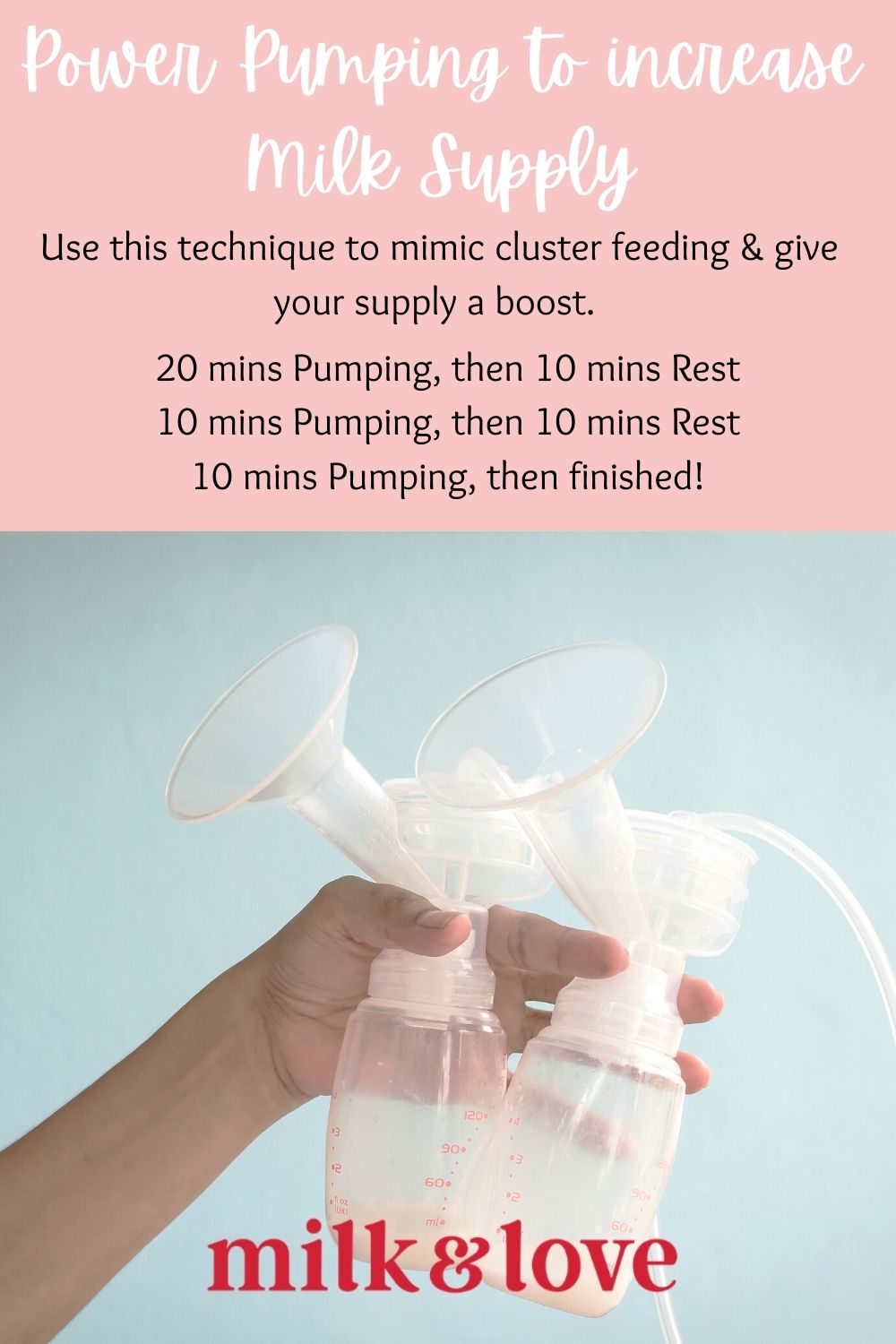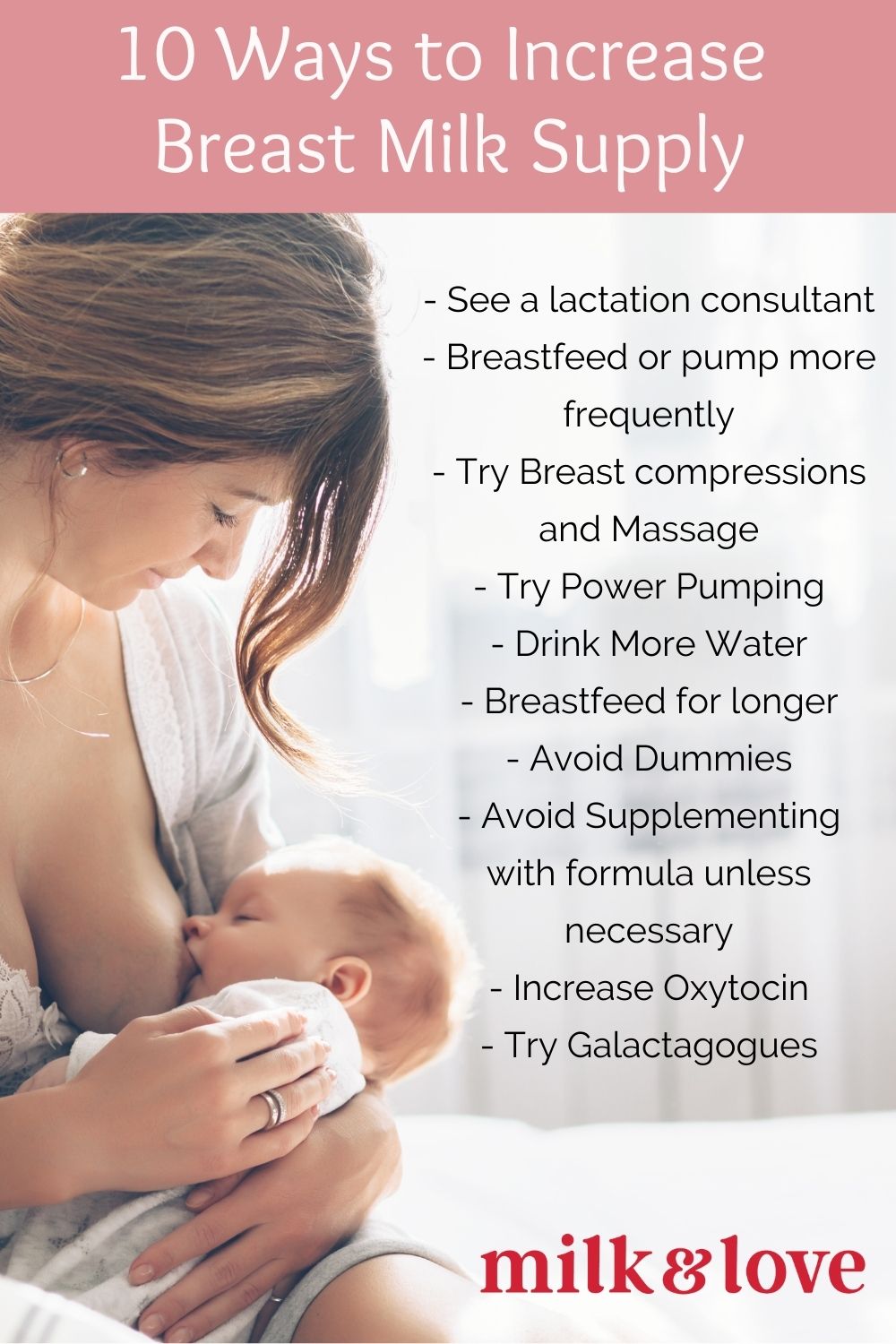How to Increase Breast Milk Supply - 10 Ways
Posted by Corryn Barakat on Oct 19, 2021
As a mother, you want to do everything you can for your baby. But one thing that mothers often worry about is the question of whether or not their breast milk production will be enough to feed their baby. This article will help you figure out some ways that you can increase your breast milk supply and keep you and your baby happy and healthy so you don't have to worry about whether you are making enough milk.
Is your Breast Milk Supply Really Low?
Before you go and start using these tips and tricks, it's a good idea to check whether baby is getting enough milk and whether you really do need to increase milk production. There are several reasons why Mum's feel that they have low milk supply or that their milk flow isn't enough, but it could just be a normal stage.
- Baby is breastfeeding ALL the time.
This is pretty normal, and in fact a new baby should breastfeed at least 8 times every 24 hours. As often as 12 times every 24 hours is normal. In addition, baby will often breastfeed more often during developmental leaps, or growth spurts, or if they are coming down with a cold.
- Breasts feel 'empty'.
The first 6 to 8 weeks you feel like your breasts are so full they might explode. This is just a temporary stage while your body works out how much milk to make for your baby. Once your body has worked out how much milk to make, it just produces that amount and you will no longer feel so 'full'.
- Baby is fussy at the breast and seems unsatisfied.
There could be many reasons for baby to be fussy at the breast, from teething to a sore tummy to overstimulation or tiredness! Also, sometimes when your baby is about to have a growth spurt they might increase their feeding and be fussy and unsatisfied, which might make you feel really empty and drained. However, in a few days, your body will start producing more milk in response to the increased demand and everything will go back to normal.
- Baby is waking up a lot at night and seems hungry.
This could be due to a developmental leap, a growth spurt or overtiredness, just to name a few possibilities! If this is new then it is probably just a stage. You can offer the breast more often and continue to breastfeed when baby wakes at night because this will help to increase your milk supply. If this is an ongoing thing (e.g. more than a month), then you might want to speak to a health professional.
- Your expressed breast milk is not enough
There are many reasons why you may not be able to pump enough milk or you're not making any extra milk. This is something to explore with a lactation consultant. Generally, we are not able to pump as much milk for your baby as our babies can extract when they feed at the breast, but there are ways to help increase your pumping volume that a lactation consultant can help you with.
If your baby is going through a growth spurt and feeding more often, or if you are going back to work and needing to pump more breastmilk then using the tips below to help support or increase your milk supply can be helpful. Don't overdo it though, because having too much milk can cause tummy upsets and can be difficult to manage too! Your milk supply adjusts depending on what signals you send to your body.
How to tell if you have low milk supply
The three key ways to tell if you have low milk supply are:
- Baby is not gaining weight in accordance with the World Health Organisation Growth Charts.
- Insufficient wet and dirty nappies, based on babies age.
- Baby is tired or fussy most of the time
You can also watch this video with IBCLC, Jo Cowan on how to tell if you have low milk supply.
If you have low milk supply then you need to seek medical advice such as a lactation consultant or child health nurse to help your baby gain weight and to identify any underlying causes.
10 ways to increase breast milk supply naturally
1. See a lactation consultant
A lactation consultant will be able to identify any underlying issues such as tongue tie, inefficient milk removal or other subtle problems that can interfere with your milk supply. They will also be able to help you work out if you need to supplement with formula or donor milk, and if so how much to supplement without further reducing your milk supply. Click here to find a lactation consultant near you. You can also contact the Australian Breastfeeding Association for helpful support and feedback.
2. Breastfeed or pump more frequently
One of the best ways to increase breast milk production is to breastfeed your baby more often, or express milk more often. The minimum your baby should feed is 8 times every 24 hours. If you are breastfeeding less than this then your baby may not be getting enough milk, and your milk production may start to decrease. Breastfeeding in the evening and overnight can be particularly helpful in increasing your milk production as this is when your body has high prolactin levels that help govern milk supply.
3. Try Breast Compressions and Massage
Running your fingers down your breast to the nipple before you start pumping or breastfeeding is a good way to help start milk flow. Once you've started pumping or breastfeeding you can try breast compressions, which is where you squeeze your breast like a hamburger to help push the milk out. It is a good idea to rotate the angle so you stimulate all the different milk ducts.
4. Try Power Pumping
Power pumping is a technique you can try for a short period of time, normally just a couple of days, to help boost your milk supply. This technique is designed to mimic cluster feeding, or how a baby breastfeeds when they're about to have a growth spurt and in turn tells your body it needs to make more milk. You will need a pump (a double electric pump is best if you have one or if you can hire one).
To power pump set aside an hour or two during the day for a couple of days and alternate between pumping and resting, mimicking the way your baby cluster feeds. An example might be:
- 20 minutes pumping, then 10 minutes rest
- 10 minutes pumping, then 10 minutes rest
- 10 minutes pumping, and you're DONE!
Remember that even if you're not producing much milk, or dry pumping, the nipple stimulation is still sending signals to your brain that it needs to make more milk. This normally takes a couple of days to increase your milk supply.

5. Drink more Water
Simple yet effective method for increasing milk supply! Your body needs more water to be able to make more milk. If you're getting dehydrated you might notice your pee is a darker yellow than normal and you need to drink more water. You want to aim for colourless to light yellow pee, which means your body is hydrated.
Get a reusable water bottle and keep it full of water and nearby, so you can sip from it throughout the day. Add some mint leaves or a squeeze of lemon if you need some flavour!
6. Breastfeed for longer
It is a good idea to encourage baby to breastfeed for longer at each feed if possible, particularly if s/he isn't feeding very often. You can do this by encouraging them to stay on the breast until they have had a full feed or keep switching sides until baby has definitely had enough. The additional nipple stimulation from more suckling is great for increasing your milk supply!
7. Avoid using a dummy
Using a dummy is likely to reduce your breastfeeding sessions and can therefore decrease milk supply, especially in the first 6 to 8 weeks while your body is working out how much milk to produce. You will make more milk if you breastfeed more often, and your baby will want to suckle more if they don't have a dummy.
A dummy can also stop baby from crying, but also stops them from communicating with you. It tends to make it difficult to identify what is causing distress and can make parents less responsive.
8. Avoid supplementing with formula unnecessarily
If you are worried that baby isn't getting enough breast milk then adding a bottle of formula after a breastfeed can seem like a good idea. The problem is that when we add formula then baby won't breastfeed as often or as much, and then our body gets the message that it doesn't need to make more milk, and your milk supply will continue to decrease.
Formula supplementation may be needed if your baby isn't putting on enough weight, or for many other reasons, but to avoid reducing milk supply it is a good idea to consult with a lactation consultant to make sure you're not sabotaging your milk supply! A good lactation consultant will also help you put together a plan to increase your milk supply and reduce supplementation over time if that is what you want.
9. Increase your oxytocin naturally
If you're feeling stressed when you're breastfeeding or pumping, that can inhibit milk supply. One of the key hormones that helps you release breast milk is oxytocin (the love hormone). There are several ways you can increase oxytocin when you're breastfeeding or pumping but they can be different for every woman. You need to tune into how you're feeling and work out what pushes your love buttons! Some ideas to increase oxytocin include:
- doing more skin-to-skin contact with your baby, which will activate oxytocin AND prolactin.
- consciously relaxing your shoulders and spend time smelling baby's head and bonding
- breastfeeding while lying down, or in a quiet room away from the rest of the family
- reading a light hearted book or watching a light hearted TV show that helps you feel relaxed and loving
10. Try adding galactagogues into your diet
Galactagogues are foods that are associated with increasing breast milk production. Most commonly included in Lactation Cookies or breastfeeding tea, they can be helpful in increasing your energy and the nutrients in your diet.
You can find out more about Galactagogues in this blog or shop our range of lactation supplements here.
Over to you! What have you found to be helpful for increasing milk supply?

About the Author
Corryn is a lover of coffee, hugs and sunshine. Mum of 3 and founder of Milk and Love, Corryn loves chatting to new mums and pregnant mums. She has extensive breastfeeding experience, and is an advocate for gentle parenting, cosleeping and looking after Mum's mental health... read more about Corryn here



